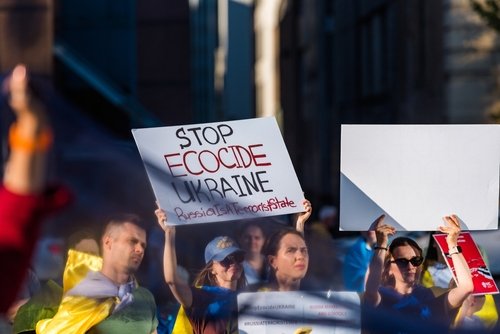Belgium, (Brussels Morning Newspaper) While observers continue to search for the guilty side in the Kakhovka dam explosion in Ukraine the primary focus shall lie in looking for ways of immediately reacting to the humanitarian and ecological emergencies that are unfolding in front of the eyes of the world community. The lack of a functioning global response to the biggest technogenic catastrophe in decades in Europe demonstrates one thing: the world has no response mechanisms to ecological terrorism and to the use of the environmental factor in modern warfare. The world seems to be failing yet another crash test proving its resilience and emergency response capabilities very weak.
The Russian intentional explosion of the Kakhovka dam is the greatest man-made disaster since the Russian large-scale invasion and the biggest in Europe for decades. The total environmental and humanitarian impact is yet to be determined but what is clear already now is the flooding of 80 settlements and over 600 km2 of the land. The negative consequences of this terrorist attack on wildlife will be visible over an area of at least 5,000 km², twice the size of Luxemburg.
According to the Minister of Environment Protection statement, 700 000 people in both Ukrainian-controlled and Russian-occupied territories are restricted to drinking water. The evacuation of the population from the territories under Russian occupation is impeded due to shootings by Russian troops. Thirty percent of southern Ukrainian national parks are at risk of disappearance, 160 thousand birds and 20 thousand wild animals are under threat of death.
Ukraine has already lost over 6.5 cub kilometers of fresh water which impacts about 70% of the Ukrainian population and directly undermines national water security. Just to compare, Europe’s economic activity consumes 243 cub kilometers of fresh water yearly. Agricultural lands of Southern Ukraine are dramatically damaged. Some 20% of global food security is under threat. The disaster has a transboundary impact as massive water flows with multiple chemical pollutants and mines from the Russian-occupied territories flow into the Black Sea damaging the biodiversity and ecosystem of the Black Sea area and coastal states with recreational potential.
The lack of a proper response mechanism on behalf of international organizations and the world community at large is seen on multiple fronts. From a legal perspective, the blow-up of the dam is almost impossible to qualify for is – ecocide, as this term is vaguely formulated in international law. Ecocide is almost impossible to prove, and a proper international mechanism for bringing eco-perpetrators to justice does not exist. Ukraine’s legislation contains such provisions but remains limited to national jurisdiction.
The international community’s and specifically the UN’s reaction to date was also disappointing. The Security Council seating that traditionally did not render any results comes as no surprise. Yet the appalling official UN Twitter account celebrating Russian language day the day the Kakhovka dam was blown up, which served to outrage Ukrainians and their officials, proves an absolute disfunction even in emergency communications let alone tangible political assistance. In the circumstances of the UN’s deadlock in safeguarding peace and security, one could hope for at least the humanitarian assistance framework to function properly. Yet, neither the UN nor the ICRC can currently negotiate access to the occupied territories of Kherson oblast, where civilians are trapped for days without food, water, or medicine.
Other UN bodies like IAEA, the UN’s atomic energy agency, or UNEP, its environmental body, seem to have failed to prepare meaningful contingency plans in case of a dam explosion and its consequences. Last autumn Ukrainian authorities signaled the dam had been mined by Russian forces leaving plenty of time for global actors to elaborate a response plan and use all diplomatic means to try to mitigate or prevent the catastrophe.
The EU stopped short to follow up on its February 2023 resolution recognizing Russia as a state sponsor of terrorism and as a state that “uses means of terrorism”. While the Parliament called on the EU and its member states to put in place a proper legal framework and consider adding Russia to the list of terrorist states, this has not been done to date.
The world clearly needs a holistic review of the gaps in its response capabilities to disasters in wartimes. This, however, will require time which is of the essence now. In the meantime, a set of resolute and bold political measures can be applied immediately to help those in need and put pressure on the perpetrator. First and foremost, international aid relief organizations like the UN and ICRC enjoying open channels of communication with Russia shall immediately elicit access to the occupied territories where people are held hostage in dire humanitarian circumstances. As a matter of political punishment, UN member states can take measures to initiate Russia’s suspension from various UN fora, including UNEP and IAEA. The latter is known for having fallen under tremendous Russian influence through an unproportionate presence of Russians in its secretariat, including IAEA’s Deputy Director formerly serving in Putin’s circles. EU’s response, apart from elaborating a legal framework and finally agreeing on sanctions on Rosatom and Russia’s nuclear industry, can be the re-direction of the future CBAM taxes from Russia to Ukraine’s green recovery. The Global South states, in the meantime, should beware of cooperation with Russia in energy projects. Ukraine’s experience demonstrates the risks of having another country possess full technical information and access to your critical infrastructure.
The Kakhovka dam is the first among dozens of Ukrainian critical infrastructure facilities under Russian occupation. No doubt, Russia is closely observing the world’s reaction to the Kakhovka dam explosion treating it as a litmus test for future operations. For example, the Crimean Titan chemical plant is reported to be mined too which in the event of an explosion would lead to a huge ammonia cloud spreading in an unknown direction.
If multiple international organizations and the civilized world fail this test the consequences will be even more disastrous.




